Hospitality Destination Planning & Development Report - Brazil
VerifiedAdded on 2020/10/05
|9
|2469
|214
Report
AI Summary
This report delves into the intricacies of destination planning and development within the hospitality sector, focusing specifically on Brazil. It outlines various policy approaches for managing and regenerating tourist destinations, including boosterism, collaboration, and integrated strategies. The report emphasizes the importance of holistic tourism planning for sustainable development, highlighting ways to raise awareness, foster communication, and involve political entities and local communities. It further explores the crucial role of tourism planning in developing and regenerating tourist destinations, discussing its impact on economic growth, environmental quality, and the overall sustainability of the tourism industry. The report concludes with a summary of the key findings and recommendations for effective tourism management and sustainable development in Brazil.
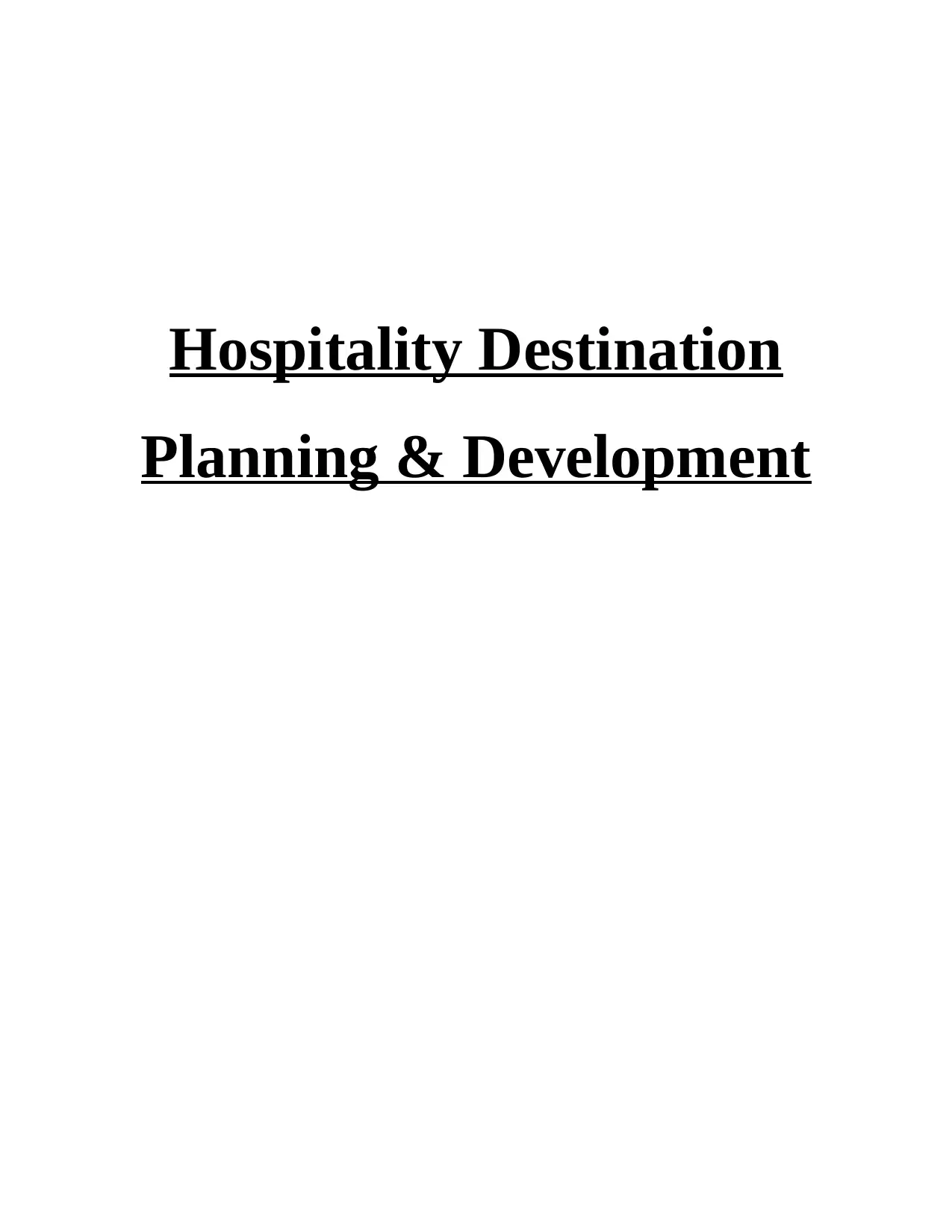
Hospitality Destination
Planning & Development
Planning & Development
Paraphrase This Document
Need a fresh take? Get an instant paraphrase of this document with our AI Paraphraser
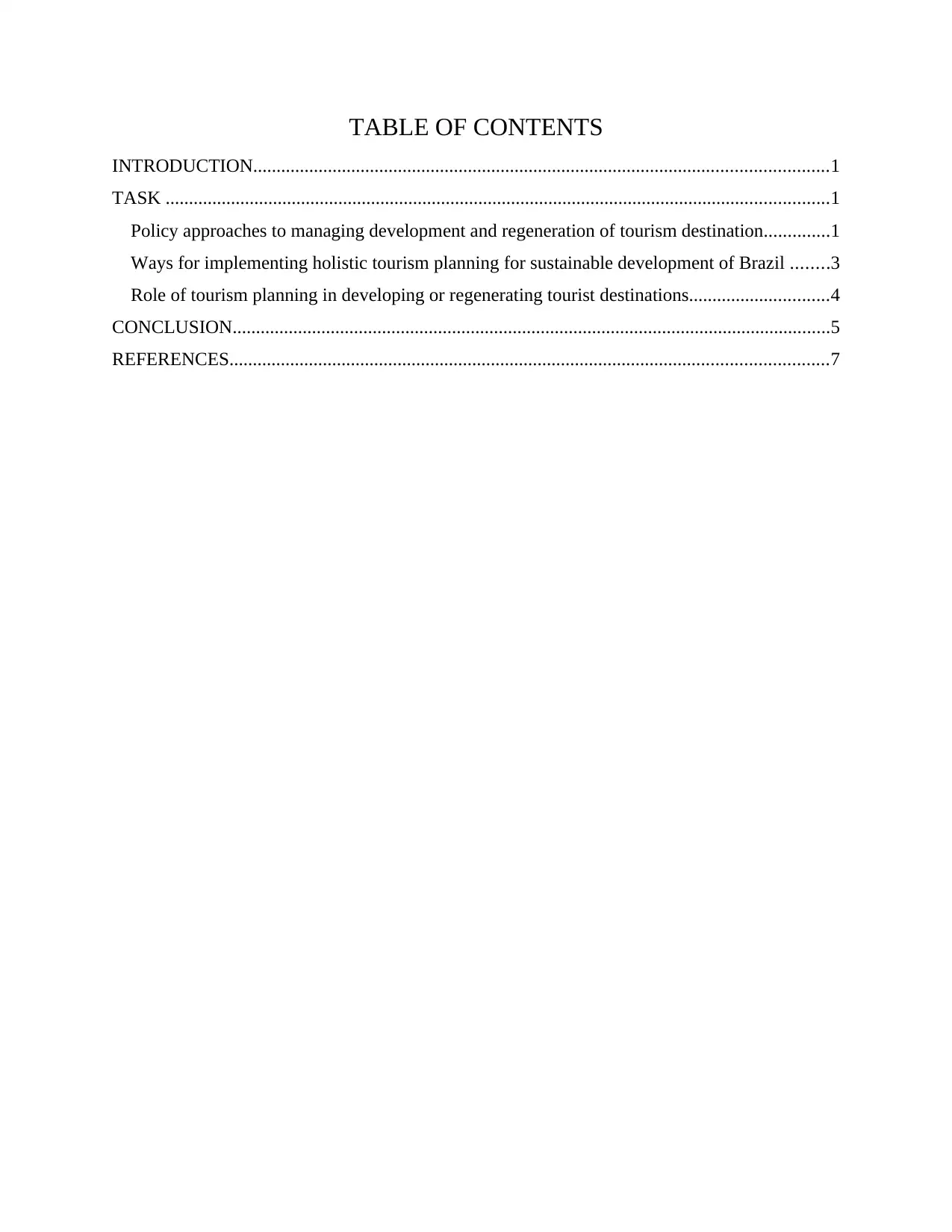
TABLE OF CONTENTS
INTRODUCTION...........................................................................................................................1
TASK ..............................................................................................................................................1
Policy approaches to managing development and regeneration of tourism destination..............1
Ways for implementing holistic tourism planning for sustainable development of Brazil ........3
Role of tourism planning in developing or regenerating tourist destinations..............................4
CONCLUSION................................................................................................................................5
REFERENCES................................................................................................................................7
INTRODUCTION...........................................................................................................................1
TASK ..............................................................................................................................................1
Policy approaches to managing development and regeneration of tourism destination..............1
Ways for implementing holistic tourism planning for sustainable development of Brazil ........3
Role of tourism planning in developing or regenerating tourist destinations..............................4
CONCLUSION................................................................................................................................5
REFERENCES................................................................................................................................7
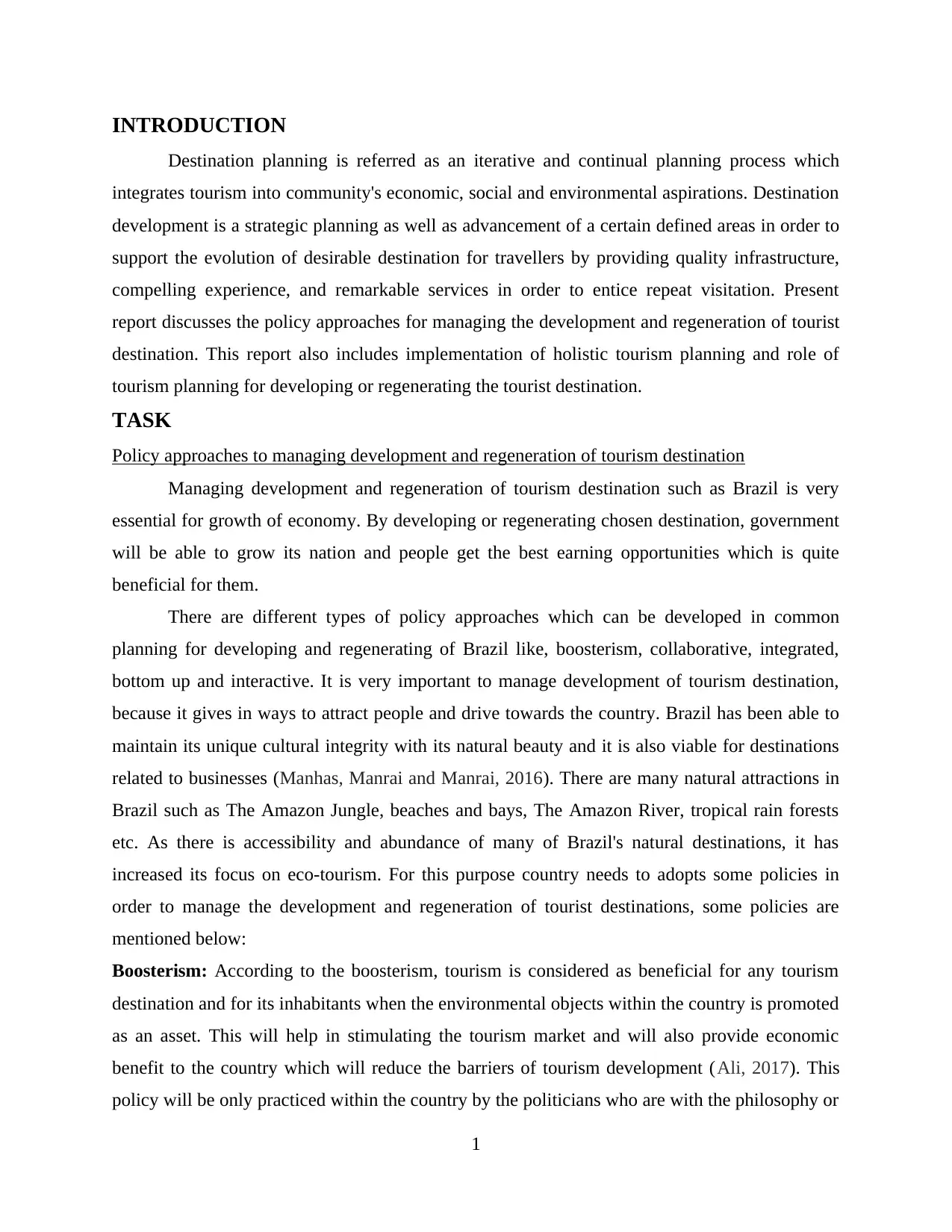
INTRODUCTION
Destination planning is referred as an iterative and continual planning process which
integrates tourism into community's economic, social and environmental aspirations. Destination
development is a strategic planning as well as advancement of a certain defined areas in order to
support the evolution of desirable destination for travellers by providing quality infrastructure,
compelling experience, and remarkable services in order to entice repeat visitation. Present
report discusses the policy approaches for managing the development and regeneration of tourist
destination. This report also includes implementation of holistic tourism planning and role of
tourism planning for developing or regenerating the tourist destination.
TASK
Policy approaches to managing development and regeneration of tourism destination
Managing development and regeneration of tourism destination such as Brazil is very
essential for growth of economy. By developing or regenerating chosen destination, government
will be able to grow its nation and people get the best earning opportunities which is quite
beneficial for them.
There are different types of policy approaches which can be developed in common
planning for developing and regenerating of Brazil like, boosterism, collaborative, integrated,
bottom up and interactive. It is very important to manage development of tourism destination,
because it gives in ways to attract people and drive towards the country. Brazil has been able to
maintain its unique cultural integrity with its natural beauty and it is also viable for destinations
related to businesses (Manhas, Manrai and Manrai, 2016). There are many natural attractions in
Brazil such as The Amazon Jungle, beaches and bays, The Amazon River, tropical rain forests
etc. As there is accessibility and abundance of many of Brazil's natural destinations, it has
increased its focus on eco-tourism. For this purpose country needs to adopts some policies in
order to manage the development and regeneration of tourist destinations, some policies are
mentioned below:
Boosterism: According to the boosterism, tourism is considered as beneficial for any tourism
destination and for its inhabitants when the environmental objects within the country is promoted
as an asset. This will help in stimulating the tourism market and will also provide economic
benefit to the country which will reduce the barriers of tourism development (Ali, 2017). This
policy will be only practiced within the country by the politicians who are with the philosophy or
1
Destination planning is referred as an iterative and continual planning process which
integrates tourism into community's economic, social and environmental aspirations. Destination
development is a strategic planning as well as advancement of a certain defined areas in order to
support the evolution of desirable destination for travellers by providing quality infrastructure,
compelling experience, and remarkable services in order to entice repeat visitation. Present
report discusses the policy approaches for managing the development and regeneration of tourist
destination. This report also includes implementation of holistic tourism planning and role of
tourism planning for developing or regenerating the tourist destination.
TASK
Policy approaches to managing development and regeneration of tourism destination
Managing development and regeneration of tourism destination such as Brazil is very
essential for growth of economy. By developing or regenerating chosen destination, government
will be able to grow its nation and people get the best earning opportunities which is quite
beneficial for them.
There are different types of policy approaches which can be developed in common
planning for developing and regenerating of Brazil like, boosterism, collaborative, integrated,
bottom up and interactive. It is very important to manage development of tourism destination,
because it gives in ways to attract people and drive towards the country. Brazil has been able to
maintain its unique cultural integrity with its natural beauty and it is also viable for destinations
related to businesses (Manhas, Manrai and Manrai, 2016). There are many natural attractions in
Brazil such as The Amazon Jungle, beaches and bays, The Amazon River, tropical rain forests
etc. As there is accessibility and abundance of many of Brazil's natural destinations, it has
increased its focus on eco-tourism. For this purpose country needs to adopts some policies in
order to manage the development and regeneration of tourist destinations, some policies are
mentioned below:
Boosterism: According to the boosterism, tourism is considered as beneficial for any tourism
destination and for its inhabitants when the environmental objects within the country is promoted
as an asset. This will help in stimulating the tourism market and will also provide economic
benefit to the country which will reduce the barriers of tourism development (Ali, 2017). This
policy will be only practiced within the country by the politicians who are with the philosophy or
1
⊘ This is a preview!⊘
Do you want full access?
Subscribe today to unlock all pages.

Trusted by 1+ million students worldwide
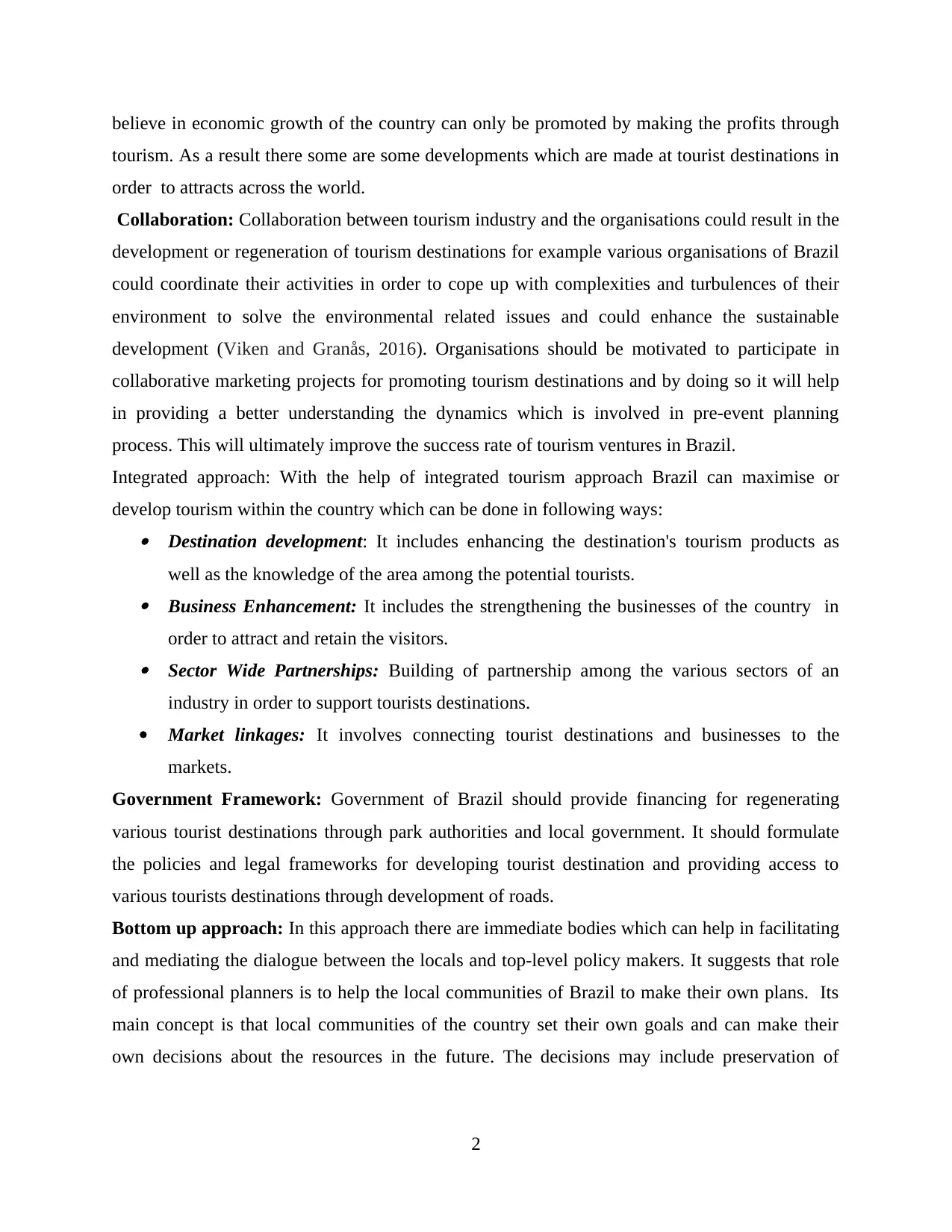
believe in economic growth of the country can only be promoted by making the profits through
tourism. As a result there some are some developments which are made at tourist destinations in
order to attracts across the world.
Collaboration: Collaboration between tourism industry and the organisations could result in the
development or regeneration of tourism destinations for example various organisations of Brazil
could coordinate their activities in order to cope up with complexities and turbulences of their
environment to solve the environmental related issues and could enhance the sustainable
development (Viken and Granås, 2016). Organisations should be motivated to participate in
collaborative marketing projects for promoting tourism destinations and by doing so it will help
in providing a better understanding the dynamics which is involved in pre-event planning
process. This will ultimately improve the success rate of tourism ventures in Brazil.
Integrated approach: With the help of integrated tourism approach Brazil can maximise or
develop tourism within the country which can be done in following ways: Destination development: It includes enhancing the destination's tourism products as
well as the knowledge of the area among the potential tourists. Business Enhancement: It includes the strengthening the businesses of the country in
order to attract and retain the visitors. Sector Wide Partnerships: Building of partnership among the various sectors of an
industry in order to support tourists destinations.
Market linkages: It involves connecting tourist destinations and businesses to the
markets.
Government Framework: Government of Brazil should provide financing for regenerating
various tourist destinations through park authorities and local government. It should formulate
the policies and legal frameworks for developing tourist destination and providing access to
various tourists destinations through development of roads.
Bottom up approach: In this approach there are immediate bodies which can help in facilitating
and mediating the dialogue between the locals and top-level policy makers. It suggests that role
of professional planners is to help the local communities of Brazil to make their own plans. Its
main concept is that local communities of the country set their own goals and can make their
own decisions about the resources in the future. The decisions may include preservation of
2
tourism. As a result there some are some developments which are made at tourist destinations in
order to attracts across the world.
Collaboration: Collaboration between tourism industry and the organisations could result in the
development or regeneration of tourism destinations for example various organisations of Brazil
could coordinate their activities in order to cope up with complexities and turbulences of their
environment to solve the environmental related issues and could enhance the sustainable
development (Viken and Granås, 2016). Organisations should be motivated to participate in
collaborative marketing projects for promoting tourism destinations and by doing so it will help
in providing a better understanding the dynamics which is involved in pre-event planning
process. This will ultimately improve the success rate of tourism ventures in Brazil.
Integrated approach: With the help of integrated tourism approach Brazil can maximise or
develop tourism within the country which can be done in following ways: Destination development: It includes enhancing the destination's tourism products as
well as the knowledge of the area among the potential tourists. Business Enhancement: It includes the strengthening the businesses of the country in
order to attract and retain the visitors. Sector Wide Partnerships: Building of partnership among the various sectors of an
industry in order to support tourists destinations.
Market linkages: It involves connecting tourist destinations and businesses to the
markets.
Government Framework: Government of Brazil should provide financing for regenerating
various tourist destinations through park authorities and local government. It should formulate
the policies and legal frameworks for developing tourist destination and providing access to
various tourists destinations through development of roads.
Bottom up approach: In this approach there are immediate bodies which can help in facilitating
and mediating the dialogue between the locals and top-level policy makers. It suggests that role
of professional planners is to help the local communities of Brazil to make their own plans. Its
main concept is that local communities of the country set their own goals and can make their
own decisions about the resources in the future. The decisions may include preservation of
2
Paraphrase This Document
Need a fresh take? Get an instant paraphrase of this document with our AI Paraphraser
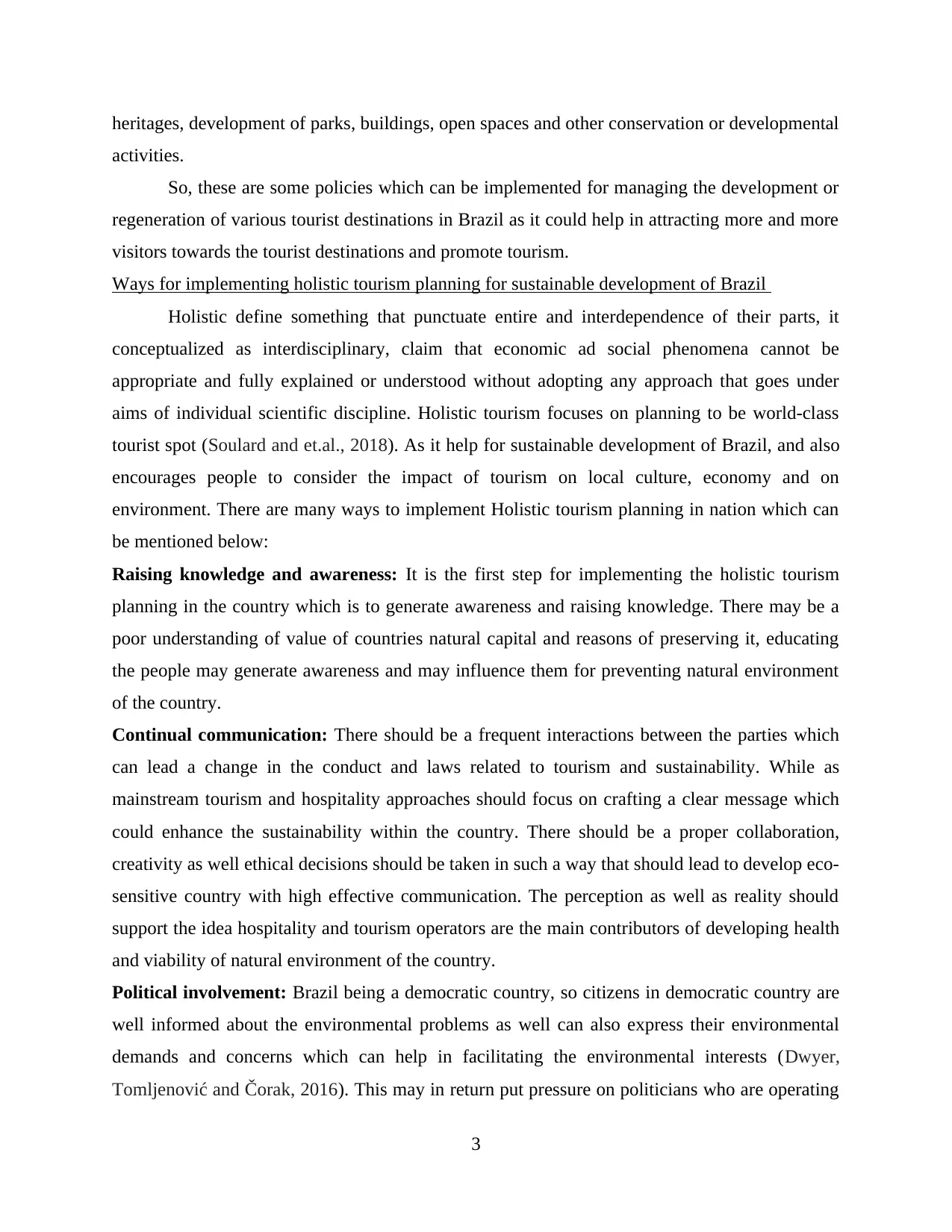
heritages, development of parks, buildings, open spaces and other conservation or developmental
activities.
So, these are some policies which can be implemented for managing the development or
regeneration of various tourist destinations in Brazil as it could help in attracting more and more
visitors towards the tourist destinations and promote tourism.
Ways for implementing holistic tourism planning for sustainable development of Brazil
Holistic define something that punctuate entire and interdependence of their parts, it
conceptualized as interdisciplinary, claim that economic ad social phenomena cannot be
appropriate and fully explained or understood without adopting any approach that goes under
aims of individual scientific discipline. Holistic tourism focuses on planning to be world-class
tourist spot (Soulard and et.al., 2018). As it help for sustainable development of Brazil, and also
encourages people to consider the impact of tourism on local culture, economy and on
environment. There are many ways to implement Holistic tourism planning in nation which can
be mentioned below:
Raising knowledge and awareness: It is the first step for implementing the holistic tourism
planning in the country which is to generate awareness and raising knowledge. There may be a
poor understanding of value of countries natural capital and reasons of preserving it, educating
the people may generate awareness and may influence them for preventing natural environment
of the country.
Continual communication: There should be a frequent interactions between the parties which
can lead a change in the conduct and laws related to tourism and sustainability. While as
mainstream tourism and hospitality approaches should focus on crafting a clear message which
could enhance the sustainability within the country. There should be a proper collaboration,
creativity as well ethical decisions should be taken in such a way that should lead to develop eco-
sensitive country with high effective communication. The perception as well as reality should
support the idea hospitality and tourism operators are the main contributors of developing health
and viability of natural environment of the country.
Political involvement: Brazil being a democratic country, so citizens in democratic country are
well informed about the environmental problems as well can also express their environmental
demands and concerns which can help in facilitating the environmental interests (Dwyer,
Tomljenović and Čorak, 2016). This may in return put pressure on politicians who are operating
3
activities.
So, these are some policies which can be implemented for managing the development or
regeneration of various tourist destinations in Brazil as it could help in attracting more and more
visitors towards the tourist destinations and promote tourism.
Ways for implementing holistic tourism planning for sustainable development of Brazil
Holistic define something that punctuate entire and interdependence of their parts, it
conceptualized as interdisciplinary, claim that economic ad social phenomena cannot be
appropriate and fully explained or understood without adopting any approach that goes under
aims of individual scientific discipline. Holistic tourism focuses on planning to be world-class
tourist spot (Soulard and et.al., 2018). As it help for sustainable development of Brazil, and also
encourages people to consider the impact of tourism on local culture, economy and on
environment. There are many ways to implement Holistic tourism planning in nation which can
be mentioned below:
Raising knowledge and awareness: It is the first step for implementing the holistic tourism
planning in the country which is to generate awareness and raising knowledge. There may be a
poor understanding of value of countries natural capital and reasons of preserving it, educating
the people may generate awareness and may influence them for preventing natural environment
of the country.
Continual communication: There should be a frequent interactions between the parties which
can lead a change in the conduct and laws related to tourism and sustainability. While as
mainstream tourism and hospitality approaches should focus on crafting a clear message which
could enhance the sustainability within the country. There should be a proper collaboration,
creativity as well ethical decisions should be taken in such a way that should lead to develop eco-
sensitive country with high effective communication. The perception as well as reality should
support the idea hospitality and tourism operators are the main contributors of developing health
and viability of natural environment of the country.
Political involvement: Brazil being a democratic country, so citizens in democratic country are
well informed about the environmental problems as well can also express their environmental
demands and concerns which can help in facilitating the environmental interests (Dwyer,
Tomljenović and Čorak, 2016). This may in return put pressure on politicians who are operating
3
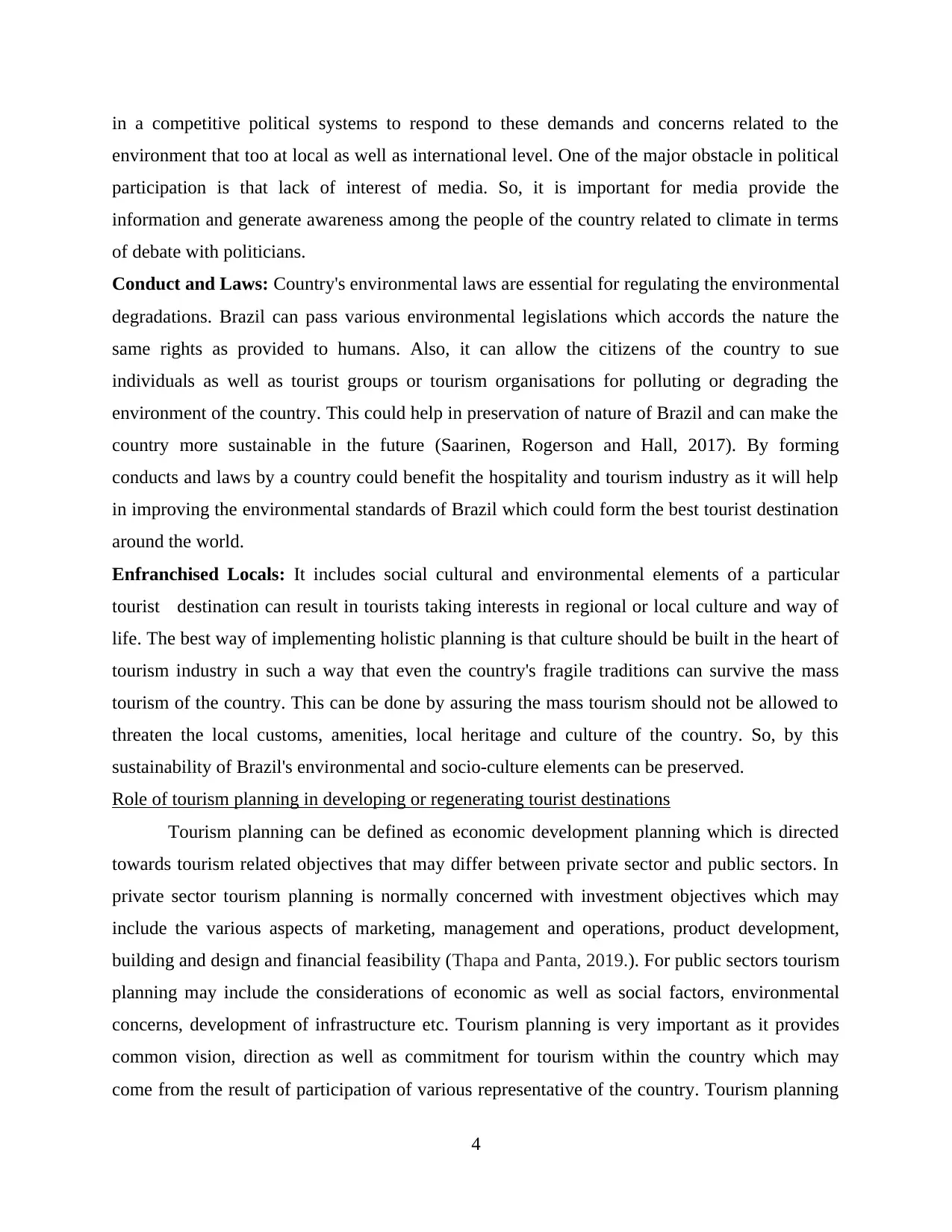
in a competitive political systems to respond to these demands and concerns related to the
environment that too at local as well as international level. One of the major obstacle in political
participation is that lack of interest of media. So, it is important for media provide the
information and generate awareness among the people of the country related to climate in terms
of debate with politicians.
Conduct and Laws: Country's environmental laws are essential for regulating the environmental
degradations. Brazil can pass various environmental legislations which accords the nature the
same rights as provided to humans. Also, it can allow the citizens of the country to sue
individuals as well as tourist groups or tourism organisations for polluting or degrading the
environment of the country. This could help in preservation of nature of Brazil and can make the
country more sustainable in the future (Saarinen, Rogerson and Hall, 2017). By forming
conducts and laws by a country could benefit the hospitality and tourism industry as it will help
in improving the environmental standards of Brazil which could form the best tourist destination
around the world.
Enfranchised Locals: It includes social cultural and environmental elements of a particular
tourist destination can result in tourists taking interests in regional or local culture and way of
life. The best way of implementing holistic planning is that culture should be built in the heart of
tourism industry in such a way that even the country's fragile traditions can survive the mass
tourism of the country. This can be done by assuring the mass tourism should not be allowed to
threaten the local customs, amenities, local heritage and culture of the country. So, by this
sustainability of Brazil's environmental and socio-culture elements can be preserved.
Role of tourism planning in developing or regenerating tourist destinations
Tourism planning can be defined as economic development planning which is directed
towards tourism related objectives that may differ between private sector and public sectors. In
private sector tourism planning is normally concerned with investment objectives which may
include the various aspects of marketing, management and operations, product development,
building and design and financial feasibility (Thapa and Panta, 2019.). For public sectors tourism
planning may include the considerations of economic as well as social factors, environmental
concerns, development of infrastructure etc. Tourism planning is very important as it provides
common vision, direction as well as commitment for tourism within the country which may
come from the result of participation of various representative of the country. Tourism planning
4
environment that too at local as well as international level. One of the major obstacle in political
participation is that lack of interest of media. So, it is important for media provide the
information and generate awareness among the people of the country related to climate in terms
of debate with politicians.
Conduct and Laws: Country's environmental laws are essential for regulating the environmental
degradations. Brazil can pass various environmental legislations which accords the nature the
same rights as provided to humans. Also, it can allow the citizens of the country to sue
individuals as well as tourist groups or tourism organisations for polluting or degrading the
environment of the country. This could help in preservation of nature of Brazil and can make the
country more sustainable in the future (Saarinen, Rogerson and Hall, 2017). By forming
conducts and laws by a country could benefit the hospitality and tourism industry as it will help
in improving the environmental standards of Brazil which could form the best tourist destination
around the world.
Enfranchised Locals: It includes social cultural and environmental elements of a particular
tourist destination can result in tourists taking interests in regional or local culture and way of
life. The best way of implementing holistic planning is that culture should be built in the heart of
tourism industry in such a way that even the country's fragile traditions can survive the mass
tourism of the country. This can be done by assuring the mass tourism should not be allowed to
threaten the local customs, amenities, local heritage and culture of the country. So, by this
sustainability of Brazil's environmental and socio-culture elements can be preserved.
Role of tourism planning in developing or regenerating tourist destinations
Tourism planning can be defined as economic development planning which is directed
towards tourism related objectives that may differ between private sector and public sectors. In
private sector tourism planning is normally concerned with investment objectives which may
include the various aspects of marketing, management and operations, product development,
building and design and financial feasibility (Thapa and Panta, 2019.). For public sectors tourism
planning may include the considerations of economic as well as social factors, environmental
concerns, development of infrastructure etc. Tourism planning is very important as it provides
common vision, direction as well as commitment for tourism within the country which may
come from the result of participation of various representative of the country. Tourism planning
4
⊘ This is a preview!⊘
Do you want full access?
Subscribe today to unlock all pages.

Trusted by 1+ million students worldwide
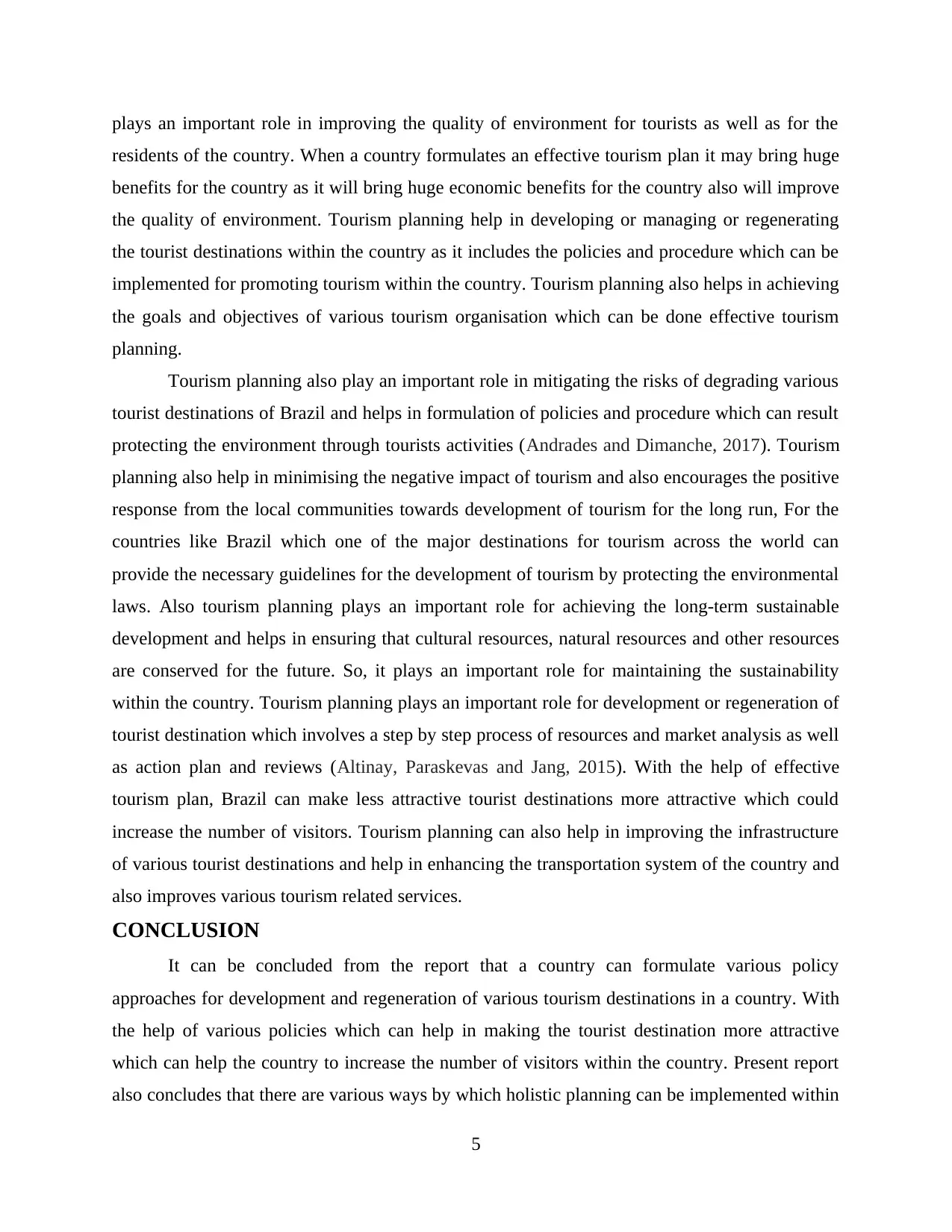
plays an important role in improving the quality of environment for tourists as well as for the
residents of the country. When a country formulates an effective tourism plan it may bring huge
benefits for the country as it will bring huge economic benefits for the country also will improve
the quality of environment. Tourism planning help in developing or managing or regenerating
the tourist destinations within the country as it includes the policies and procedure which can be
implemented for promoting tourism within the country. Tourism planning also helps in achieving
the goals and objectives of various tourism organisation which can be done effective tourism
planning.
Tourism planning also play an important role in mitigating the risks of degrading various
tourist destinations of Brazil and helps in formulation of policies and procedure which can result
protecting the environment through tourists activities (Andrades and Dimanche, 2017). Tourism
planning also help in minimising the negative impact of tourism and also encourages the positive
response from the local communities towards development of tourism for the long run, For the
countries like Brazil which one of the major destinations for tourism across the world can
provide the necessary guidelines for the development of tourism by protecting the environmental
laws. Also tourism planning plays an important role for achieving the long-term sustainable
development and helps in ensuring that cultural resources, natural resources and other resources
are conserved for the future. So, it plays an important role for maintaining the sustainability
within the country. Tourism planning plays an important role for development or regeneration of
tourist destination which involves a step by step process of resources and market analysis as well
as action plan and reviews (Altinay, Paraskevas and Jang, 2015). With the help of effective
tourism plan, Brazil can make less attractive tourist destinations more attractive which could
increase the number of visitors. Tourism planning can also help in improving the infrastructure
of various tourist destinations and help in enhancing the transportation system of the country and
also improves various tourism related services.
CONCLUSION
It can be concluded from the report that a country can formulate various policy
approaches for development and regeneration of various tourism destinations in a country. With
the help of various policies which can help in making the tourist destination more attractive
which can help the country to increase the number of visitors within the country. Present report
also concludes that there are various ways by which holistic planning can be implemented within
5
residents of the country. When a country formulates an effective tourism plan it may bring huge
benefits for the country as it will bring huge economic benefits for the country also will improve
the quality of environment. Tourism planning help in developing or managing or regenerating
the tourist destinations within the country as it includes the policies and procedure which can be
implemented for promoting tourism within the country. Tourism planning also helps in achieving
the goals and objectives of various tourism organisation which can be done effective tourism
planning.
Tourism planning also play an important role in mitigating the risks of degrading various
tourist destinations of Brazil and helps in formulation of policies and procedure which can result
protecting the environment through tourists activities (Andrades and Dimanche, 2017). Tourism
planning also help in minimising the negative impact of tourism and also encourages the positive
response from the local communities towards development of tourism for the long run, For the
countries like Brazil which one of the major destinations for tourism across the world can
provide the necessary guidelines for the development of tourism by protecting the environmental
laws. Also tourism planning plays an important role for achieving the long-term sustainable
development and helps in ensuring that cultural resources, natural resources and other resources
are conserved for the future. So, it plays an important role for maintaining the sustainability
within the country. Tourism planning plays an important role for development or regeneration of
tourist destination which involves a step by step process of resources and market analysis as well
as action plan and reviews (Altinay, Paraskevas and Jang, 2015). With the help of effective
tourism plan, Brazil can make less attractive tourist destinations more attractive which could
increase the number of visitors. Tourism planning can also help in improving the infrastructure
of various tourist destinations and help in enhancing the transportation system of the country and
also improves various tourism related services.
CONCLUSION
It can be concluded from the report that a country can formulate various policy
approaches for development and regeneration of various tourism destinations in a country. With
the help of various policies which can help in making the tourist destination more attractive
which can help the country to increase the number of visitors within the country. Present report
also concludes that there are various ways by which holistic planning can be implemented within
5
Paraphrase This Document
Need a fresh take? Get an instant paraphrase of this document with our AI Paraphraser
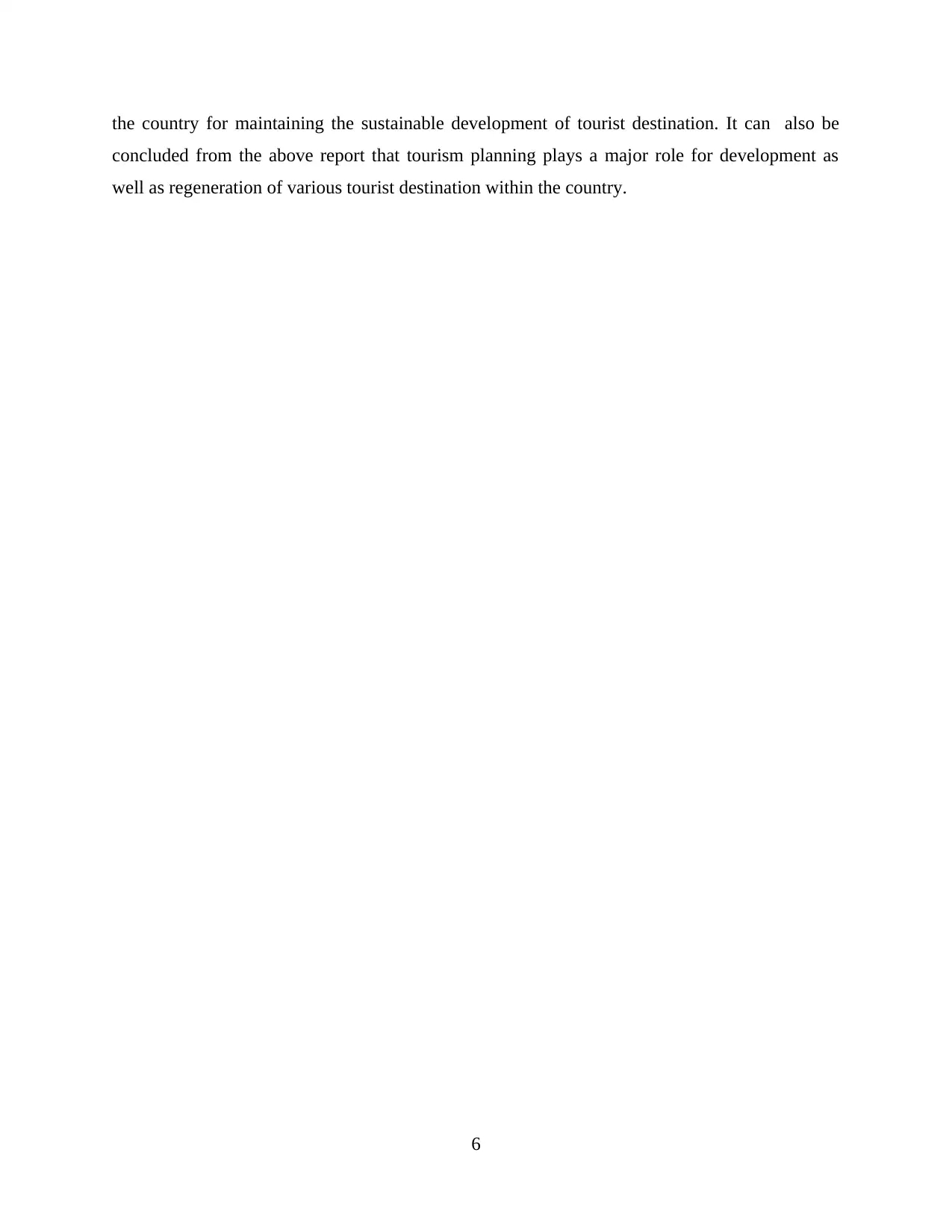
the country for maintaining the sustainable development of tourist destination. It can also be
concluded from the above report that tourism planning plays a major role for development as
well as regeneration of various tourist destination within the country.
6
concluded from the above report that tourism planning plays a major role for development as
well as regeneration of various tourist destination within the country.
6
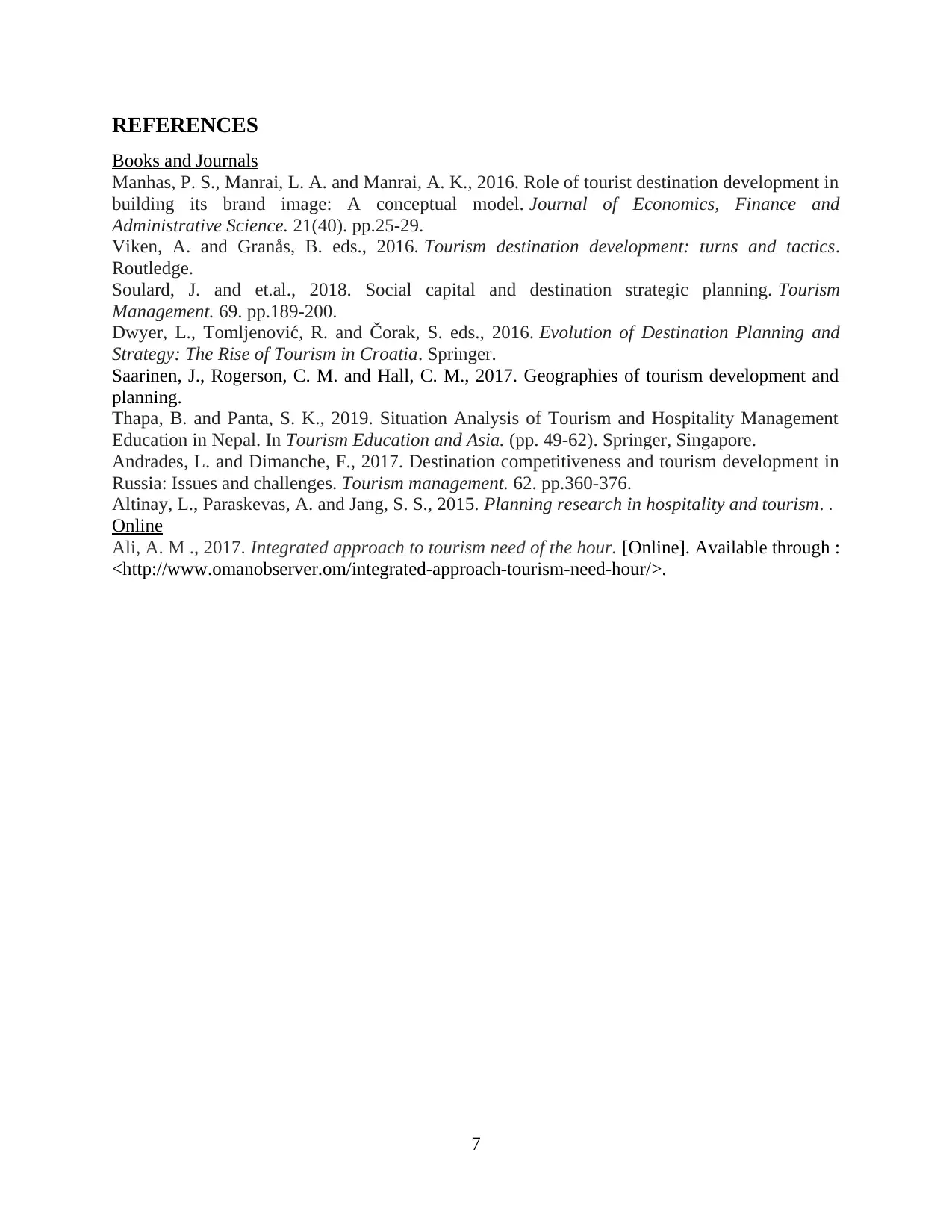
REFERENCES
Books and Journals
Manhas, P. S., Manrai, L. A. and Manrai, A. K., 2016. Role of tourist destination development in
building its brand image: A conceptual model. Journal of Economics, Finance and
Administrative Science. 21(40). pp.25-29.
Viken, A. and Granås, B. eds., 2016. Tourism destination development: turns and tactics.
Routledge.
Soulard, J. and et.al., 2018. Social capital and destination strategic planning. Tourism
Management. 69. pp.189-200.
Dwyer, L., Tomljenović, R. and Čorak, S. eds., 2016. Evolution of Destination Planning and
Strategy: The Rise of Tourism in Croatia. Springer.
Saarinen, J., Rogerson, C. M. and Hall, C. M., 2017. Geographies of tourism development and
planning.
Thapa, B. and Panta, S. K., 2019. Situation Analysis of Tourism and Hospitality Management
Education in Nepal. In Tourism Education and Asia. (pp. 49-62). Springer, Singapore.
Andrades, L. and Dimanche, F., 2017. Destination competitiveness and tourism development in
Russia: Issues and challenges. Tourism management. 62. pp.360-376.
Altinay, L., Paraskevas, A. and Jang, S. S., 2015. Planning research in hospitality and tourism. .
Online
Ali, A. M ., 2017. Integrated approach to tourism need of the hour. [Online]. Available through :
<http://www.omanobserver.om/integrated-approach-tourism-need-hour/>.
7
Books and Journals
Manhas, P. S., Manrai, L. A. and Manrai, A. K., 2016. Role of tourist destination development in
building its brand image: A conceptual model. Journal of Economics, Finance and
Administrative Science. 21(40). pp.25-29.
Viken, A. and Granås, B. eds., 2016. Tourism destination development: turns and tactics.
Routledge.
Soulard, J. and et.al., 2018. Social capital and destination strategic planning. Tourism
Management. 69. pp.189-200.
Dwyer, L., Tomljenović, R. and Čorak, S. eds., 2016. Evolution of Destination Planning and
Strategy: The Rise of Tourism in Croatia. Springer.
Saarinen, J., Rogerson, C. M. and Hall, C. M., 2017. Geographies of tourism development and
planning.
Thapa, B. and Panta, S. K., 2019. Situation Analysis of Tourism and Hospitality Management
Education in Nepal. In Tourism Education and Asia. (pp. 49-62). Springer, Singapore.
Andrades, L. and Dimanche, F., 2017. Destination competitiveness and tourism development in
Russia: Issues and challenges. Tourism management. 62. pp.360-376.
Altinay, L., Paraskevas, A. and Jang, S. S., 2015. Planning research in hospitality and tourism. .
Online
Ali, A. M ., 2017. Integrated approach to tourism need of the hour. [Online]. Available through :
<http://www.omanobserver.om/integrated-approach-tourism-need-hour/>.
7
⊘ This is a preview!⊘
Do you want full access?
Subscribe today to unlock all pages.

Trusted by 1+ million students worldwide
1 out of 9
Related Documents
Your All-in-One AI-Powered Toolkit for Academic Success.
+13062052269
info@desklib.com
Available 24*7 on WhatsApp / Email
![[object Object]](/_next/static/media/star-bottom.7253800d.svg)
Unlock your academic potential
Copyright © 2020–2026 A2Z Services. All Rights Reserved. Developed and managed by ZUCOL.





